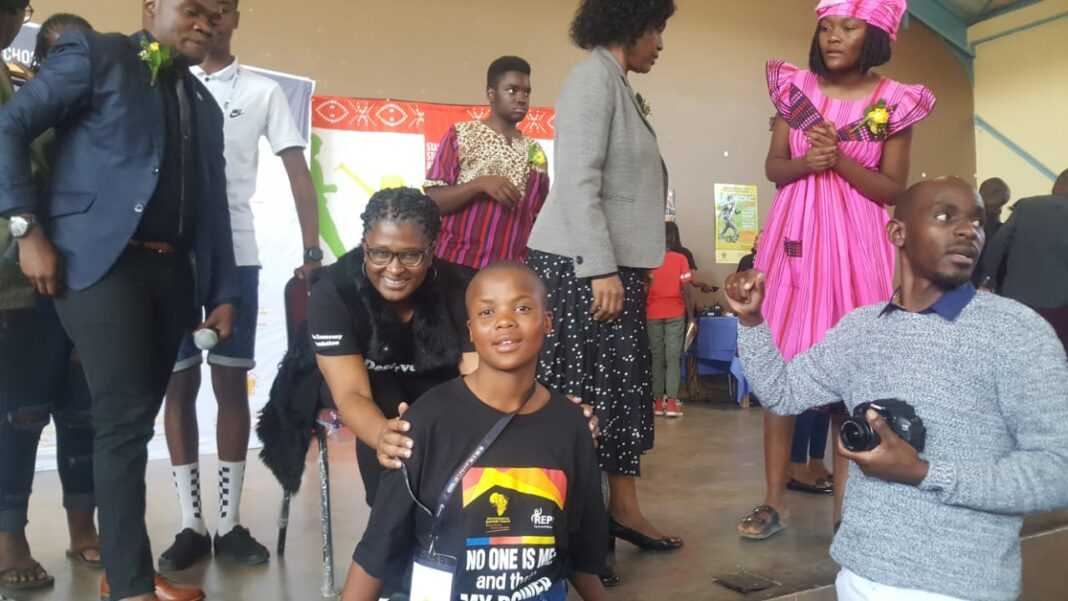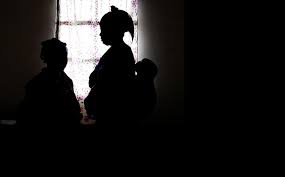
Lerato Matheka
Dreams have become clearer for 16 year old Retsepile Motseki.
She wants to become a doctor once she finishes her High School education.
Wearing a smile of bravery, Motseki is engaging with peers well from different countries.
She gave birth to her daughter at 14 years, shortly after she joined the marriage institution.
She is freely interacting with the children from her group looking at two topics; Know more about sexual health and Too young to be a parent.
Both topic resonated well with Motseki and she is dominating the discussion and sharing her story to enforce their presentation.
Sharing a laughter and exchange of ideas, the child participants display confidence and passion.
Motseki is part of 52 children and youth attending the Regional Psychosocial Support Initiative (Repssi) childrens Forum in Namibia Windhoek.
The Forum has different programs where children interact and a different one where policy makers and other relevant organisations share their success stories on issues of Psychosocial support and mental wellbeing for children and youth.
The forum which puts a microscope on the empowerment both girls and boys and is celebrated under the theme; Breaking barriers, Creating Connections.
I only realised I was pregnant six months into it and I told my then partner of the situation, she related her story to Newsday.
He quickly told his family and they agreed to marry me. At 14 years, I really didn’t understand much of sits before my life.
I wanted to escape the prying judgmental eyes of the community and to in a way make my family proud for at least being pregnant with an active partner, she narrates.
She is one of the many young girls who without proper knowledge of sex education fell prey to peer pressure.
Now a mother of a two year old daughter, born and bred in Mpharane Mohales Hoek, Motseki dropped out of school at Form 1 at 14 and got married.
She tells Newsday that the relation with her partner was shadowed by fear and confusion.
He told me that we are now dating and as hard as I tried to deny him, his statue and physical build made it difficult. He was tall and spoke a lot sense to me at the time.
We stayed together in a relation for about a year from when I was between 12 and 13 years. He never told me his age but I knew he was older than me.
A shepherd herding animals as his job and me a Form 1 students, the communication was never easy, Motseki recounts.
She indicates that after she saw her periods at 13, her boyfriend introduced sex.
We never used a condom and I never knew what was going on, what was expected of me and how to react. It happened a number of times for months.
Motseki quickly indicate that her lack of knowledge was the biggest driving factor.
Living in a village where child marriage was not strongly shunned, her peers were vocal about sexual experiences.
I lived in a household build on single women. My mother had be when she was nineteen and she was never at home. She is always away trying out life in South Africa, selling things, but predominantly she is never home.
My grandmother, not so old though, is unemployed, she relies heavily on community work and fato-fato which is not sustainable. However, we have always survived. The point I am trying to make is that with my family set-up, there has never been any opportunity to have the sex talk with anyone.
She indicated that she hid her periods from her family for months before her elder relative sister got suspicious of her always missing pads.
I would steal half packet of pads from my sisters stash. Ad I had become a serial pad thief, until one time she decided to sit me down and ask me if I had started seeing my days.
That almost broke the communication. I didn’t tell anyone about my periods in fear of being reprimanded, she says narrating how she witnessed her sister being grilled by her grandmother.
That day, my mother was home when my sister broke the news about her body changes. I have never seen such rage thrown at her, I mean she broke into tears when both the women were shouting at her and telling her she will get pregnant and that if she was seen playing with boys she will receive a beating. When it was my time, I took a decision to avoid that fury and unfortunately it wasn’t helpful.
Fast forward to her life in marriage, Motseki says after the boys family accept her, she then started her Antenatal Clinic sessions and gave birth naturally.
She commends her in laws for the support saying she was not subjected to cultural norms of being forced to take traditional medications in order to ease delivery.
My grandmother in law would take walks with me and to the last day, she ensured that the neighbours were equally helpful.
She tells Newsday her first contractions were an alien feeling which drove people into panic.
She was quickly taken to the clinic and two hours later she had given birth to a bouncy health baby girl.
The health practitioners were shocked that I managed a natural birth and they were helpful.
Escaping marriage
Her story was then discovered by World Vision office in Mohales Hoek and Motseki in laws were urged to allow her to go back to school, for she was still a child.
Their denial signed the end of her marriage.
During the Easter holidays last year World Vision called my in laws asking that I be allowed to return to school. All the organisation wanted at first was that the family write a consent letter especially because I was too young to be married.
They refused to let me go until World Vision involved the police which resolved that since that marriage setting was illegal by law, the relationship and marriage should come to an end. The resolution was also that the child will be shared by both families, she said saying the boy was still only 18 years.
She notes that after all was resolved she was reintegrated back into the education system and is not in Form 2.
She is no studying at Likhakeng High School.
I am at a happy place in my life. I am now a child again, she smiles saying expectations from the marriage institution were too high for her.
I was expected to be an adult and do heavy chores which I didn’t even know, while other were too complex for my body.
A UN 2015 report revealed that one out of five girls in Lesotho are married before they turn 18 years old. The report adds that at least 2% marries at age 15 and 19% before they get to 18 years old.
The countrys Marriage Act of 1974 only allows marriage to be solemnised at age of 21 for both men and women. However, with the written permission of the minister, girls can marry at age 16 and boys at 18.
According to Girls not a bride organisation, 17% of girls in Lesotho are married before the age of 18 with 1% getting married before their 15th birthday.
Traditional Norms
Despite my story, more young girls my age work hard to get married.
They even make it competitive that by 15 years, they should have children. I try to speak with them, but it seem to not be working.
In my community, there are only six girls my age who don’t have children and not married, the rest, well with a disappointed voice she reveals.
She adds, Parents not working hard enough to discourage this. Since it has been happening from way in the past, it seems to be traditionally accepted.
The African Union Ambassador for Ending Child Marriage, Nyaradzayi Gumbonzvanda charges that calling this Child Marriage is actually normalising it.
She is one of the speakers to give an overview of the African Union work on issues around a girl child and the Africans pledge to ending child marriage.
Naming is norming. What we name defines what we want and this has escalated it to policies.
Child Marriage- the name justifies a crime, we are normalising the sexual exploitation, she said
She added, Marriage is more than the few minutes and child marriage is depriving a child of her childhood.
Gumbonzvanda indicates that at least 20 million girls are experiencing child marriage everyday with Africa worse.
There are cases where after being rescued, they still get married again, or worse are subjected to abuse.
It is time we stopped normalising this crime by giving it glory. It is traumatising and we also need to break the barriers of services for the girls, she said.
Shawa Remmy, the HIV and Health Education Officer for Eastern and Southern African UNESCO Regional Office for Southern Africa (ROSA) indicated that through the Situational Analysis: Early and Unintended Pregnancy in East and Southern Africa study, percentage of 15-19 year olds ever pregnant was high in all countries- at least 15% of young women; while in Malawi, Tanzania, and Zambia, more than a 25% had been pregnant.
Some of the key findings revealed that Early and Unintended Pregnancy is increasing in parts of ESA with Malawi pregnancy rates increased from 26% in 2010 to 29% in 2016; Tanzania from 23% in 2010 to 26.7% in 2015, he said with his recording noting Lesotho sitting at 19.1% of Early pregnancies and 56% of unintended pregnancies for girls aged 15-19 years, 50% of them till primary school, he revealed from the African work the organisation is doing in different African counties.
In 2013, Ministers of Health and Education from 21 countries in Eastern and Southern Africa endorsed an ESA Ministerial
Commitment. The Ministers agreed to focus on Early and Unintended Pregnancy (EUP) as a priority issue across all countries
In 2017, the Technical Coordinating Group (TCG) of the Commitment commissioned a situational analysis and a regional Campaign on EUP.
He highlighted that in 2016, there were 21 million pregnancies among adolescents (15, 19 years) in developing countries, of which around 45% in Africa were unintended.
Rates of teen pregnancy in the region range from 15% to over 25%, and are some of the highest in the world. EUP is on the increase in parts of ESA. For example, Malawi pregnancy rates increased from 26% to 29% (2010-16); Tanzania from 23% to 26.7% (2010-15).
He related that transactional and intergenerational sexual relationships common, related to both poverty/survival and the need to obtain material goods that are unaffordable.
Two-third of adolescent mothers in East Africa, and 32% in Southern Africa are already married by the age of 16 years according to a 2014 UNESCO report, and in cases where a girl falls pregnant before getting married, parents often force the girls to get married. Some girls, due to poverty, also get married early to get support from the husband.
An
older guy will be spoiling me with gifts and when comes a time whereby he wants
us to be intimate, I can’t refuse and say that he is older than me because he
will state that he does everything for me and he may even refuse to use a
condom saying that his gifts come unwrapped and I can’t expect him to use a
condom in return.“Young mothers FGD, Lesotho, December 2017 said during one of the sessions, he revealed.
Remmy noted that pregnant girls experience stigma at school, at clinics as well as in the community.
Girls who are pregnant are called different, often derogatory names in schools and communities. Many girls risked unsafe abortion to avoid the shame, ridicule, dropping out of school, and responsibility associated with early pregnancy and raising a child. In addition pregnant teenagers may have difficulty during childbirth, pregnancy related mortality and morbidity, HIV and other sexually transmitted infections (STIs).
Girls reported going through emotional pain especially due to denial and societal rejection and ridicule. If pregnancy was a result of rape/coerced sex she is likely to experience emotional trauma, he highlighted adding that school dropout likely outcome of EUP, he said.
But unlike the girls who are stigmatised, Motseki’s life has been changed and her reintegration into school as brought more hope for her and allowed her to dream again.
Summary
- I only realised I was pregnant six months into it and I told my then partner of the situation, she related her story to Newsday.
- I wanted to escape the prying judgmental eyes of the community and to in a way make my family proud for at least being pregnant with an active partner, she narrates.
- Now a mother of a two year old daughter, born and bred in Mpharane Mohales Hoek, Motseki dropped out of school at Form 1 at 14 and got married.

Your Trusted Source for News and Insights in Lesotho!
At Newsday Media, we are passionate about delivering accurate, timely, and engaging news and multimedia content to our diverse audience. Founded with the vision of revolutionizing the media landscape in Lesotho, we have grown into a leading hybrid media company that blends traditional journalism with innovative digital platforms.










